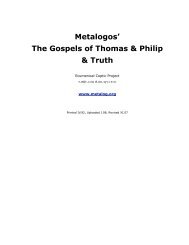Andrew Louth - Syriac Christian Church
Andrew Louth - Syriac Christian Church
Andrew Louth - Syriac Christian Church
You also want an ePaper? Increase the reach of your titles
YUMPU automatically turns print PDFs into web optimized ePapers that Google loves.
40 INTRODUCTION<br />
attachment to the truth. ‘Just as the thought of fire does not warm the<br />
body, so faith without love does not actualize the light of spiritual<br />
knowledge in the soul’ (CC I.31). He warns that ‘unless the intellect<br />
finds something more noble to which it may transfer its desire, it will<br />
not be persuaded to scorn [earthly things] completely’ (CC III.64).<br />
Simply to free oneself from the passions will lead to no lasting good:<br />
passion-free knowledge of divine things does not persuade the<br />
intellect to scorn material things completely; it is like the<br />
passion-free thought of a sensible thing. It is therefore possible to<br />
find many men who have much knowledge and yet wallow in the<br />
passions of the flesh like pigs in the mire. Through their<br />
diligence they temporarily cleanse themselves and attain<br />
knowledge, but then they grow negligent.<br />
(CC III.66)<br />
What is required, Maximus insists, is a love for God more powerful<br />
than any love we may have for earthly things:<br />
just as passion-free thought of human things does not compel<br />
the intellect to scorn divine things, so passion-free knowledge of<br />
divine things does not fully persuade it to scorn human things.<br />
For in this world truth exists in shadows and conjectures; that is<br />
why there is need for the blessed passion of holy love, which binds<br />
the intellect to spiritual contemplation and persuades it to prefer<br />
what is immaterial to what is material, and what is intelligible<br />
and divine to what is apprehended by the senses.<br />
(CC III.67)<br />
‘The blessed passion of holy love’: this is an odd phrase, since, as we<br />
have seen, in the Byzantine ascetic tradition, ‘passion’ nearly always<br />
indicates something evil (it is often, even in Maximus, more or less the<br />
equivalent of ‘vice’). 15 More starkly still, we have already learnt from<br />
Maximus that ‘dispassion engenders love’ (CC I.2). If we look closely<br />
at what Maximus has to say about apatheia, dispassion, we shall find<br />
that he is aware of the danger of an apatheia that is merely<br />
disinterestedness: apatheia must be a purified love. He seeks to<br />
prevent misunderstanding here with his very definition of passion:<br />
‘passion is an impulse of the soul contrary to nature’ (CC II.16; my<br />
italics: cf. ibid. I.35). The passions to be expelled are those that are<br />
contrary to nature: there are natural passions that are perfectly proper.<br />
Apatheia, then, is the restoration of what is natural (that is, what is in<br />
accordance with unfallen nature). But Maximus goes further than<br />
this. For him, detachment from the irrational parts of the soul is the




